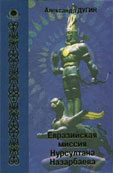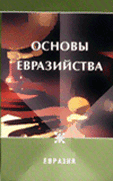 |
|
|||||
|
|
||||||
|
||||||||||||
|
 Home Page | Eurasian theory in 4 maps | Eurasian Common House | Eurasian Manifest | Eurasian Path | Eurasian Vision | Millstones of eruasianism | Structure A.DuginTHE EURASIST VISIONBasic principles of the eurasist doctrinal platform
The breath of the epochFor example, the XIX century in Russia passed under the sign of the dispute between “Slavophiles” and “Pro-westerners” [zapadniki]. In the XX century the watershed passed between “Reds” and “Whites”. The XXI century will become the century of the opposition between “atlantists” * (the supporters of “unipolar globalism” **) and “eurasists” **.
Eurasists are not only the representatives of the peoples living in the Eurasian continent. Being eurasist is a conscious choice, which means combining the aspiration to preserve the traditional forms of life with the aspiration to free creative (social and personal) development. In this way, eurasists are all free creative personalities who acknowledge the values of tradition; among them are also the representatives of those region which objectively form the bases of atlantism. Eurasists and atlantists are opposed to each other in everything. They defend two different, alternative, mutually excluding images of the world and its future. It is the opposition between eurasists and atlantists which defines the historical outline of the XXI century. The eurasist vision of the future worldThe eurasists consequently defend the principle of multi-polarity, standing against the unipolar globalism imposed by the atlantists.As the poles of this new world there shall not be the traditional states, as some new integrated civilizational formations (“great spaces”), united into “geo-economic belts” (“geo-economic zones”). According to the principle of multi-polarity, the future of the world is imagined as the equal, benevolent partnership relations among all countries and peoples, organised – according to a principle of proximity in terms of geography, culture, values and civilization – in four geo-economic belts (each one consisting in its turn of some “great spaces”). Euro-African belt, including 3 “great spaces”: the European Union, Islamic-Arab Africa, sub-tropical (black) Africa;
The eurasist vision of the evolution of the stateThe eurasists consider the nation-state, in their present features, as an obsolete form of organisation of spaces and peoples, typical of the historical period going from the XV to the XX centuries. In the place of the nation-states new political formations must rise, combining into themselves the strategical unification of the great continental spaces with the complex multi-dimensional system of national, cultural and economic autonomies inside. Some features of such organisation of spaces and peoples may be observed both in the ancient empires of the past (e.g., the empire of Alexander of Macedon, the Roman empire, etc.) and in the newest political structures (European Union, CIS).The contemporary states face today the following outlooks
The XXI century shall be the arena of the fatal decision of the contemporary political élites concerning the issue of the three possible outlooks. The struggle for the third variant of development lies at the foundations of a new wide international coalition of political forces, in tune with the eurasist world-view. The eurasists consider the Russian Federation and the CIS as the nucleus of a forthcoming autonomous political formation – the “Eurasian Union” (“core Eurasia”), and further of one of the basic four world geo-economic belts (“Eurasian continental bloc”). At the same time, the eurasists are the convinced supporters of the
development of a multi-dimensional system of autonomies *.
The principle of multi-dimensional autonomy is seen as the optimal organisational structure of the life of peoples, ethnic and social-cultural groups, in the Russian Federation as in the European Union, in the “Eurasian continental belt” as in all the remaining “great spaces” and “geo-economic belts” (“zones”). All the lands (territories) of the new political-strategic formations
(“great spaces”) must be found under direct management of a centre of strategical
government. Within the competence of the autonomy must be the issues linked
to the non-territorial aspects of the government of collectivities.
The eurasist principle of the division of powersThe eurasist principle of political management supposes two different levels of government: local and strategic.At the local level, the government is enacted through the autonomies – of course being composed of associations of different kind (from the multi-million peoples to the small collectivities made of few workers). This government acts according to absolute freedom and is not ruled by any superior instance. The model for any kind of autonomies is freely chosen, stemming from tradition, inclination, direct democratic expression of the will of the organic collectivities – societies, groups, religious organisations. Under the management of the autonomies are found:
The level of citizens’ freedom, thanks to the organisation of the society according to the eurasist principle of autonomy, is unprecedentedly high. Man is given possibilities of self-realisation and creative development never seen before in the history of mankind. The issues of strategic security, the international activities beyond
the frame of the single continental space, the macro-level economic issues,
the control over strategic resources and communications – are found under
the management of the single strategic centre *.
The spheres of competence of the strategic and local levels of power are strictly delimited. Any attempt to introduce the autonomy in the issues found under the competence of the single strategic centre must be broken off. The reverse is also true. In this way, the eurasist principles of government organically combine
in themselves traditional and religious right, national and local traditions,
take into account all the riches of the social-political regimes having
formed during the course of history, and therefore offer a solid guarantee
of stability, security and territorial inviolability.
The eurasist vision of the economyThe atlantists aim at imposing all the peoples in the world a single model of economic construction, erecting the experience of the economic development of the Western part of the world civilization in the XIX-XX centuries to the status of a standard.On the contrary, the eurasists are convinced that the economic regime derives from the historical and cultural features of the development of peoples and societies; consequently, in the economic sphere they conform to variety, plurality of regimes, creative research, free development. Subject to rigid control must be only the large scale strategic fields, linked to the need to ensure the general security (the military-industrial complex, transportation, resources, energy, communications). All the remaining economic sectors must freely and organically develop according to the conditions and the traditions of the concrete autonomies where the economic activity naturally takes place. Eurasism comes to the conclusion that in the field of economics there
is no ultimate truth – the recipes of liberalism * and Marxism * can only
be partially applied, depending on the concrete conditions. In practice,
what is needed is to combine in various ways the free market approach with
the control over the strategic fields, and to operate the redistribution
of profits according to the national and social aims of the society as
a whole. In this way, eurasism conforms to the “third way” * model in economics.
The economics of eurasism must be built on the following principles
The eurasist vision of financeThe single strategic centre of the Eurasian Union must consider as strategically relevant also the issue of the control over monetary circulation. No single means of payment must pretend to the role of universal world reserve currency. It is necessary to create a proper eurasian reserve currency, being the legal tender on the territories belonging to the Eurasian Union. No other currency shall be used within the Eurasian Union as a reserve currency.On the other hand, it must be in every way encouraged the creation of local means of payment and exchange, being the legal tender within one or more than one neighbouring autonomies. This measure prevents the accumulation of capital to speculative purposes and provides a stimulus to its circulation. Besides, it increases the size of investment into the real sector of the economy. Therefore, the funds will be invested first of all where they can be productively employed. In the eurasist project, the financial sphere is seen as an instrument
of real production and exchange, directed to the qualitative side of the
economic development. Differently from the atlantist (globalist) project,
the financial sphere must have no autonomy (financialism *) whatsoever.
The regional vision of the multi-polar world supposes different currency levels:
The eurasist attitude toward religionIn the faith to the spiritual heritage of the prophets, in the great value of the religious life, the eurasist see a token of authentic renewal and harmonic social development.The atlantists in principle refuse to see anything but the ephemeral, the temporary, the present. For them there is essentially neither past nor future. The philosophy of eurasism, on the contrary, combines the deep and sincere faith in the past with an open attitude toward the future. The eurasists greet the fidelity to the sources as well as the free creative research. Spiritual development is for the eurasists the main priority of life, whose absence cannot find compensation in any economic or social goods. In the opinion of the eurasists, every local religious tradition or system of faith, even the most insignificant, is the patrimony of all mankind. The traditional religions of the peoples, connected with different spiritual and cultural heritages, deserve the utmost care and concern. The representative structures of the traditional religion must avail themselves of the support from the strategic centres. Schismatic groups, extremist religious associations, totalitarian sects, preachers of non-traditional religious doctrines and teachings, and any other forces oriented to destruction must be actively opposed. The eurasist vision of the national questionThe eurasists consider that every people in the world – from those who founded great civilizations to the smaller ones, carefully preserving their traditions – are an inestimable wealth. The assimilation through external influence, the loss of the language or the traditional way of life, the physical extinction of any one of the peoples of the Earth is an irreparable loss for all mankind.The profusion of peoples, cultures, traditions is called by the eurasists as “blossoming complexity” – a sign of the healthy, harmonic development of the human civilization. The Great-Russians, in this connection, represent a unique case of the fusion of three ethnical components (Slavic, Turkish and Finno-Ugric) into one people, with an original tradition and a rich culture. In the same fact of the rise of the Great-Russians from the synthesis of three ethnical groups, an integration potential of exceptional worth is contained. For this same reason Russia more than once became the core of the union of many different peoples and cultures into one single civilizational interlacing. The eurasists believe that Russia is bound to play the same role also in the XXI century. The eurasists are not isolationists, to the same extent that they are not supporters of assimilation at any cost. The life and destiny of the peoples is an organic process which does not tolerate any artificial interference. Inter-ethnic and international issues must be decided according to their inner logic. Every people on Earth must be conceded the freedom to independently make their own historical choices. Nobody has the right to force any people to lose its uniqueness into the “global melting pot”, as the atlantist would wish to. The rights of the peoples are no less significant to the eurasists
than the rights of man.
Eurasia as a planetEurasism is a world-view, a philosophy, a geopolitical project, an economic theory, a spiritual movement, a nucleus around which to consolidate a wide spectrum of political forces. Eurasism is free from dogmatism, from the blind submission to the authorities and ideologies of the past. Eurasism is the ideal platform of the dweller of the new world, to whom disputes, wars, conflicts and myths of the past have but an historical interest. Eurasism as a principle is the new world-view for the new generations of the new millennium. Eurasism derives its inspiration from different philosophical, political and spiritual doctrines, which until now appeared as reciprocally irreconcilable and incompatible.Together with this, eurasism has a definite set of basic founding ideas, from which one cannot deviate under any circumstances. One of the main principles of eurasism is the consequent, active and widespread opposition to the unipolar globalist project. This opposition (differently from the simple negation or conservatism) has a creative character. We understand the inevitability of some definite historical processes: our aim is being aware of them, taking part into them, leading them to that direction which corresponds to our ideals. It might be said that eurasism is the philosophy of multi-polar globalisation, calling to the union of all societies and peoples on earth to build an original and authentic world, every component of which organically derives from historical traditions and local cultures. Historically, the first eurasist theories made their appearance among Russian thinkers at the beginning of the XX century. But those ideas were consonant with the spiritual and philosophical search of all the peoples on earth – at least, of those who realised the limited and inadequate nature of the banal dogmas, the failure and the blind alley to which the intellectual clichés were bound, the need to escape from the usual frames toward new horizons. Today we can attribute to eurasism a new, global meaning; we can realise how our eurasist heritage is not the work of the sole Russian school, more often identified under this name, as also of an enormous cultural and intellectual vein of all the peoples on earth, not strictly belonging to the narrow frame of what until recently (in the XX century) was considered as the immutable orthodoxy (liberal, Marxist and nationalist). In this highest and widest meaning, eurasism acquires a new extraordinary significance. Now it is not only the form of the national idea for the new post-communist Russia (as it was considered by the founding-fathers of the movement and the contemporary neo-eurasists in the first stage), as a vast program of planetary universal relevance, by far exceeding the borders of Russia, of the same Eurasian continent. In the same way as the concept of “americanism” today may be applied to geographical regions found beyond the borders of the same American continent, “eurasism” means a peculiar civilizational, cultural, philosophical, strategical choice, which can be made by any representative of the human kind, whatever the spot on the planet where he lives, or the national and spiritual culture to which he belongs. In order to provide this meaning of eurasism with a real content, there is still much to be done. And to the extent that newer and newer cultural, national, philosophical and religious strata will join in our project, the same global meaning of eurasism will be widened, enriched, changed in its features… Yet such evolution of the sense of the eurasist platform must not simply remain a theoretical issue – many aspects must find their expression and accomplishment only through the concrete political practice. In the eurasist synthesis, neither word can be thought without action, nor action without word. The field of the spiritual battle for the sense and the outcome of history
is the whole world. The choice of one’s own camp belongs to everyone personally.
Time will decide of the rest. Yet sooner or later, through great accomplishments
and at the cost of dramatic fights, the hour of Eurasia shall come.
 Home Page | Eurasian theory in 4 maps | Eurasian Common House | Eurasian Manifest | Eurasian Path | Eurasian Vision | Millstones of eruasianism | Structure |
Виды цветного металлопроката Воздушные завесы Топас 5 |
|||||||||||||||||||||||||||||||||||||||||||||||||||||||||||


































